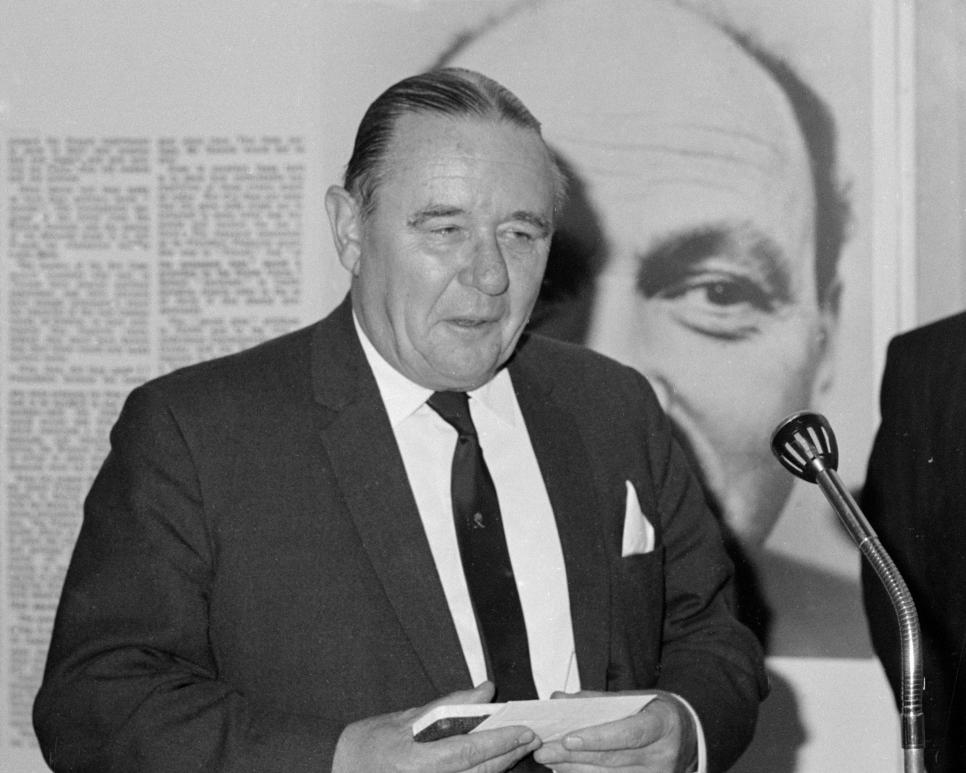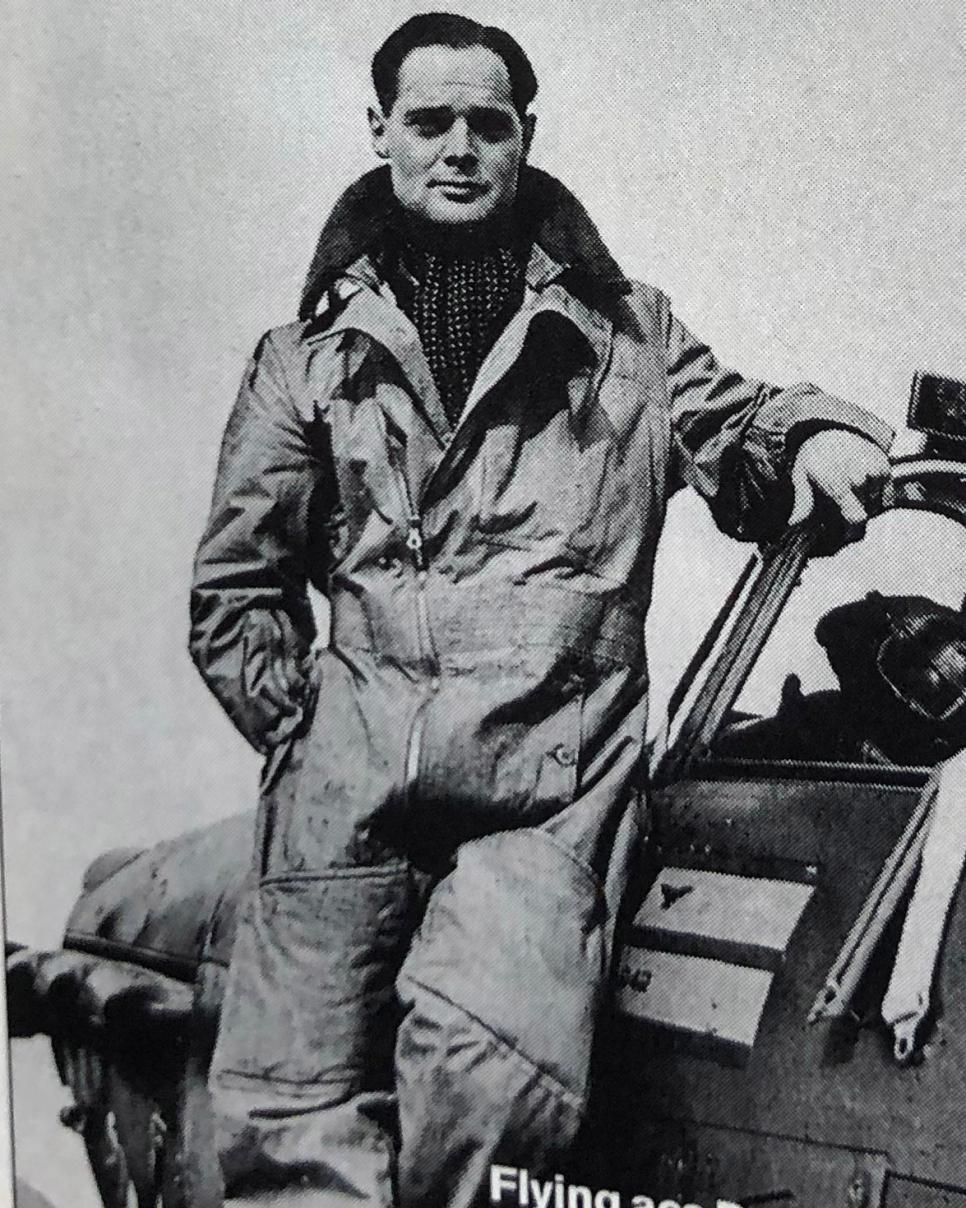News
Will the grass be greener?
From the archive (January 2000): The mystery of Henry Longhurst and Sir Douglas Bader

Mirrorpix
Editor’s note: In celebration of Golf Digest's 70th anniversary, we’re revisiting the best literature and journalism we’ve ever published. Catch up on earlier installments.
I’ve written a monthly column for Golf Digest since taking over as editor in December 1984, which, including some bonus issues, comes out to 430 homilies, give or take a three-putt. So I get to choose one of my own for the 50th installment of this Best of Golf Digest series not because it’s any good, but because I’m pickin’.
I think this column that appeared in January 2000 in the 50th-anniversary issue is appropriate as it marks a spot in time and wonders how golf will be in the future. Sport has these demarcation lines before and after big events that change the way we look at things—pre-and-post Ouimet winning the U.S. Open, pre-and-post Palmer at Cherry Hills, pre-and-post the Tiger scandal, etc. Golf now faces one of those separators: Before Corona and After Corona. So set in that context, I introduce a story told to me by one of my best friends in life, the late Peter Dobereiner, who for two decades wrote a column for Golf Digest but never wrote this story. —Jerry Tarde
***
As we stand looking into the abyss of another 50 years of Golf Digest, another 500 years of golf, another millennium of civilization, the question we ask ourselves inevitably is, will the grass be greener on the other side?
It is the ultimate golfer’s dilemma. The question brings to mind a story that comes by way of two Golf Digest columnists. One of them was the Englishman, Henry Longhurst. Henry described himself as born to travel first-class but without the price of a ticket. He was a Cambridge man, elected to Parliament in the 1940s, the former German Amateur golf champion, and a very fine writer, but in the way television twists everything, he became best known for his eloquent reporting on golf for the BBC. He was the only golf commentator to work for two American networks at the same time, both ABC and CBS, which was just as inconceivable then as now. And he was one of the great gin drinkers of all time.
By the late 1970s, when Henry was in his 70s, he was dying of cancer and forced to stop working. He lived at the time in a pair of landmark windmills known as Jack and Jill, on the top of Sussex Downs. One of his closest friends and regular visitors was an even more legendary figure in English history, the World War II flying ace, Wing Commander Sir Douglas Bader.
Bader lost both his legs in an accident in 1931 when he slow-rolled his Bristol Bulldog fighter at an air show. Somehow he won another commission from the RAF in 1939, flying Spitfire single-seat fighters specially converted with manual controls. At Dunkirk and the Battle of Britain he destroyed 30 enemy aircraft but eventually collided with a Luftwaffe Messerschmidt over France, lost one of his artificial legs parachuting and was captured by the enemy. He was so revered a figure in the war that Germany allowed Britain to airdrop in another set of tin legs—whereupon he used them to escape. Recaptured shortly thereafter, he attempted so many more escapes that his captors confiscated his legs each night. After the war, Bader turned his attention to golf and became an excellent player, reducing his handicap to 4. Needless to say, he was a man of indomitable spirit who moved a nation, the perfect companion for a dying friend.

In their weekly talks over glasses of gin, they solved the problems of golf and politics and life. When the bottle was empty, Bader went home.
As Henry’s days were drawing to a close, one afternoon he said to Bader, “Old friend, there is something I’ve always wondered.”
“What’s that, Henry?” he replied.
“I’ve always wondered: Will the grass be greener on the other side?”
Neither being particularly religious men, they talked for a while to no conclusion and parted company. That very week, Henry died, and in his mourning Bader forgot all about the conversation.
Months later, Bader was in London to speak at a Lord’s Taverners dinner. When he emerged from his cab at the place of the banquet, there standing on the street was by all appearances a beggar woman. She approached, and as Bader put his hand to his pocket, she said, “I don’t want your money. Are you Sir Douglas Bader?” He said he was.
She said, “I am a clairvoyant. I have a message from a friend of yours in the spirit world named Henry. I don’t have his last name, and I don’t know what the message means. He said, ‘Tell Bader: The grass is greener on the other side.’”
With that, she walked away, leaving Bader so shaken he did not stay for the dinner but went home in the same taxi that brought him.
The story was never told in Bader’s lifetime. He revealed it to a friend who replaced Longhurst as the British columnist for Golf Digest, Peter Dobereiner.
The details of what happened are presented here exactly as Bader related them to Dobereiner, who wondered about the veracity of the story. He thought it might have been Henry’s idea of an elaborate hoax. It remains one of golf’s greatest mysteries.
Will the grass be greener on the other side? We can only wait and see.